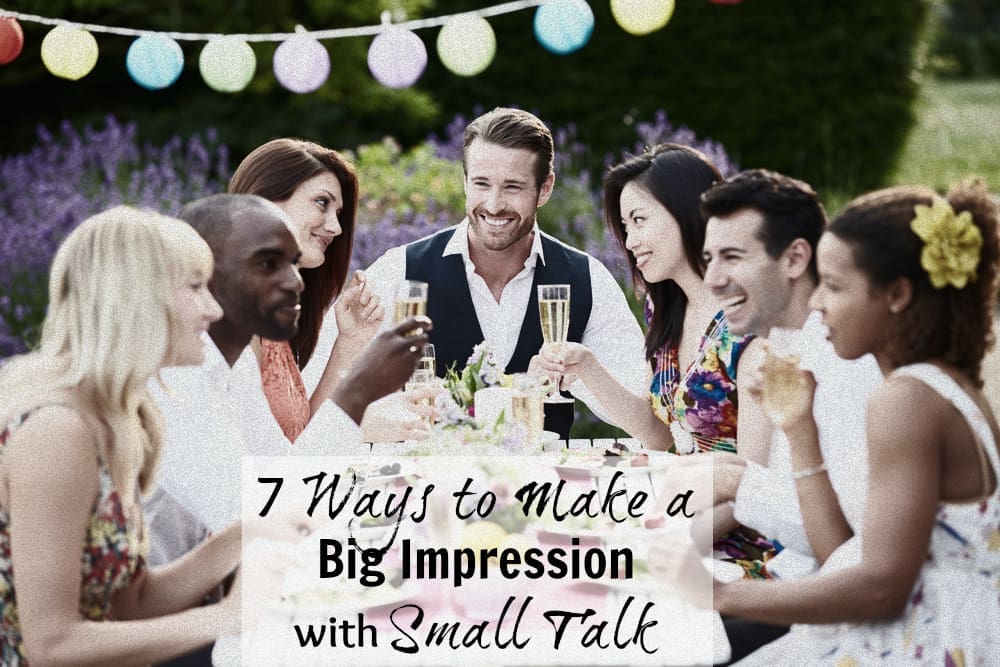Small talk might start out small but master the art (and it is an art!) and who knows where it could end up. There is spectacular potential in those first crazy, awkward minutes of so it’s important to make them count.
Like many skills, small talk will get better with practice. Here are some tips that will have your small talk making a big impression … and who doesn’t want that:
- Start small.
A comment made in passing is a building block for future conversation and relationships. A greeting, a smile, a compliment as you pass – these all make way for the opportunity to make a connection. A smile turns into a hello, turns into a how are you, turns into a chat turns into lunch turns into … who knows? But how exciting is the potential! Don’t try to figure out what the conversation will look like or where it will end up. Just start. Who knows what you could be starting.
- Aim for nice, not briliant.
You don’t need to be funny, witty or brilliant. You just have to be nice. That’s what people will remember. People generally feel most comfortable talking about themselves – (it’s the topic we know most about) so start with that. Asking questions of, and showing interest in another person will leave an impression of you as sociable, interesting, interested – and all you did was listen.
- Don’t filter.
Filtering all potential conversation through a critical filter will kill a conversation, so none of that. (Of course, there are a few conversation killers – infectious wounds and your ongoing digestion issues, for example, probably aren’t great ones to kick off with although if that’s worked for you in the past then who am I to judge, right?) If you have a tendency to overthink what comes out of your mouth, you need to know this: Because of the consideration – overconsideration – that you give to what you say, the words that come from you are likely to be spot on, even insightful, meaningful or funny. So just say it – the world deserves to hear from you.
-
What to say.
Before a social event, catching up on current events and news will equip you with potential substance for conversation. Also try taking the conversation along common paths. ‘How did the person you’re speaking to come to be here? How does she/he ono Do you work together? How long? What do you do? Asking about plans for the weekend or holidays can also open up conversation in unexpected directions. Even if the direction is ‘my parole hearing on Wednesday’, you’ve still learnt some valuable information – and what a conversation that will be.
- Building the conversation.
Conversations can quickly evolve from one topic to another, often ending up on some sort of common ground. Asking someone if they have anything interesting planned for the weekend can lead to a conversation about a restaurant they’re going to on Saturday night, which happens to be Italian, which reminds you of an Italian restaurant you’re fond which is local to you, which leads to a conversation about where you each live, and the things you like or don’t like about living there, which leads to … you get the idea. At this point, the conversation starts to take on a life of its own and you can start to relax. The point when you start to become less conscious of yourself (often around the ten minute mark) is the point when self-consciousness and shyness start to melt away.
- The Great Escape.
The most difficult part of a conversation with someone unfamiliar can be winding it up. Finding a reason to leave helps. Think about it beforehand so you have it ready. Try, ‘There’s someone over there I need to talk to. Hopefully we’ll get to talk again later.’ Or, ‘I just have to grab a drink/ go the toilet/ make a call – I promised the kids. It’s been really nice talking with you.’
- Act as if.
Thoughts and feelings often lead behaviour, but it also works the other way. Let your body take the lead and your mind will catch up. How would you hold yourself differently physically if you were confident about what you had to say. Would you stand taller, chest open, arms not across you, smile, keep eye contact for longer? Would you speak slower? Deeper? What would you say if there were no wrong things to say? Think of someone who actually is confident – or comes across that way – what do they look like or sound like? Even if you don’t believe it at first, acting as if you are confident is remarkably effective at chipping away at shyness or that awkward first five minutes of small talk.
People like people who like them. It’s that simple. Eye contact, a passing comment, asking questions to show interest – will help to establish a social connection, or at the very least something to build on in the future.
Perhaps the most important thing to remember is this: People won’t necessarily remember what you say, but they’ll always remember how you make them feel. All big things start somewhere. The next hello, followed by a few crazy, awkward minutes, might be your somewhere.


I love these suggestions because so often we see people we want to make a connection with but are just not sure how to start. It is true that a simple hello or compliment is often the best way to start!
Yes – knowing where to start is often the hardest part. I’ve yet to meet anyone who doesn’t love a compliment or ‘hello’ when it’s sent their way. It certainly always means a lot when either are given to me!